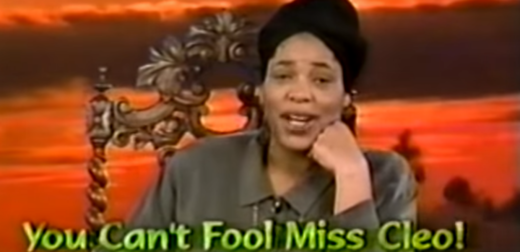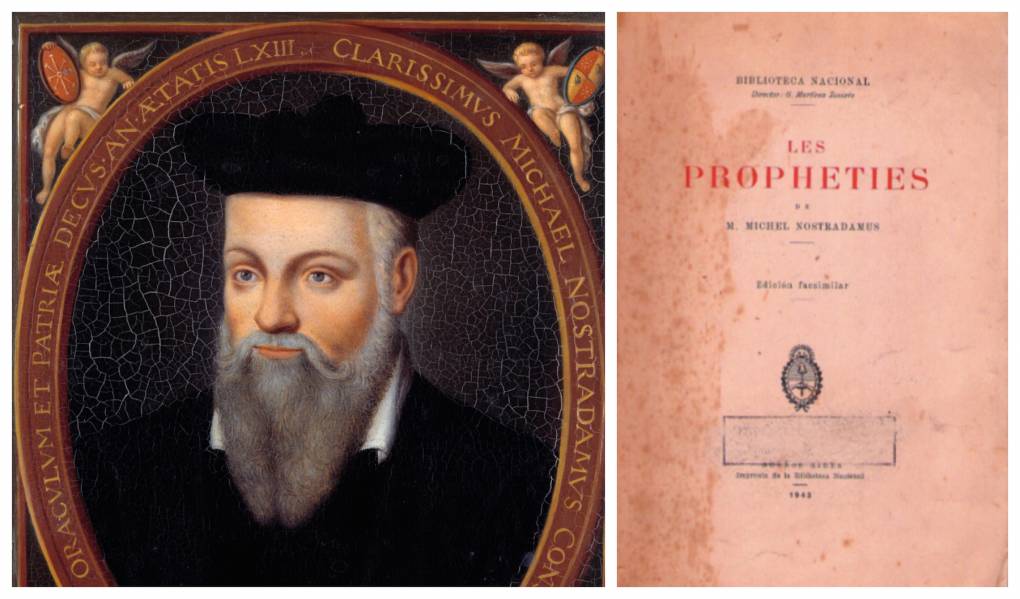No matter how far back you go in history, there is evidence of the human desire to figure out what's coming our way, and the people who claim to be able to tell us. Trying to commune with the dead, or predict the future, can be traced back at least 5,000 years. The Ancient Egyptians practiced "scrying"—reading shapes formed by dropping ink in water. The Mesopotamians did the same thing with oil. Palmistry is believed to have originated in India. When Chinese Emperor Shennong discovered tea in 2737 BC, his subjects promptly began reading leaves.
A History of TV Psychics (and Why We Love Them So Much)

The Bible itself acts as a sort of prediction manual too—especially the Book of Revelation. By 1555, the most famous soothsayer of all time, Nostradamus, was in full swing, having just released Les Propheties (The Prophecies)—a now legendary book of global predictions for the ages. By the 1700s, the French had transformed Tarot playing cards, which had been around since the 1440s, into a tool of divination. The Victorians were obsessed with séances. And in the first decades of the 1900s, the mystic Rasputin captured Russians' imaginations—and, more importantly, their ruler's.
No matter how civilization has grown and developed—including technological advancements that seemed implausible even 50 years ago—our fascination with people who claim to tell us what our futures hold, or talk to the dead, has continued unabated. In fact, according to a 2016 report, the psychic industry has been steadily growing since 2010, bringing in around $2 billion in revenue a year.
TV has (very wisely) capitalized on this for years now. Let's take a look at the psychics who have graced our screens over the years and how they compare to one another.
Tyler Henry, Hollywood Medium
Our newest magical TV unicorn is Tyler Henry, an adorable Gen Z wonder, who discovered he could communicate with dead people at the age of 10 when his grandmother died. Since then, E! has hired him to do on-camera readings with celebrities for our entertainment, which immediately begs the question: Can't he just Google them before he meets them? This does throw the plausibility of some conversations into doubt. (Did anybody think Lisa "Left Eye" Lopes wasn't going to come through when Henry talked to TLC's T-Boz?)
Henry claims he doesn't know whom he's visiting before he arrives, but his real believability lies in two factors: most of the people he gives readings to are kinda D-list (especially to someone of his age), and he often brings up very personal details that are not public knowledge. Plus, it looks an awful lot like he predicted Khloé Kardashian's troubles with Tristan Thompson.
Miss Cleo
Miss Cleo is a bonafide American legend. With a pseudo-Jamaican accent that a lot of people thought was fake, a memorable catch-phrase ("Call me now!"), and the kind of tone your no-nonsense auntie gives you when she knows you're doing something stupid, Miss Cleo was the most famous psychic in America in the late 1990s. (Parody skits by Dave Chapelle and Mad TV live on.)
Two years before her 2016 death, she did a great interview with Vice revealing everything from the low wages she received while working at the Psychic Readers Network and her family's history with voodoo, to the fact that she has never self-identified as a psychic. Miss Cleo may not have had a hotline to dead people, but she still knew enough to wow audiences.
Theresa Caputo, Long Island Medium
If Tyler Henry makes you feel like talking to dead people is just for the super-rich, Caputo proves the opposite by roaming around her native Long Island, randomly picking out people in stores and cafés, and sharing messages from their deceased loved ones. In between, she does formal readings for paying clients that are frequently emotional, despite her best efforts to keep things light and positive with her special brand of optimism. Despite the recent separation of Caputo and her husband Larry (they seemed like a perfect pair, so it's a total bummer), Long Island Medium is still going strong, thanks to Caputo's quite remarkable skills. The hairdo and nails don't hurt either.
John Edward, Crossing Over
People love being cynical about John Edward because he works with larger audiences and sometimes starts from relatively vague jumping-off points. If you ask a room of 60 people "Who passed from the heart attack?" at least one person is going to raise a hand, right? Sure, but the reason Edward is so popular around the globe (he regularly tours the UK and Australia, in addition to the US), is that once he finds a person in a crowd, he can really get into some serious nitty gritty, including very specific names. He may not seem as swift as Theresa Caputo or Tyler Henry... but he's also usually a lot less edited.
Chip Coffey
If the world of TV mediums is a field of wild cards, Chip Coffey is the wildest in the deck. Eccentric as all get out, the flamboyant Coffey, a regular on A&E shows like Paranormal State and Psychic Kids, is prone to using the kinds of methods more commonly employed in horror movies (ouija boards, séances, etc.). Where other TV mediums aim to provide strangers and clients with advice and comfort, Coffey attempts to scare the bejesus out of everyone.
Whether you believe in their line of work or not, there's a good chance that, 200 years from now, mediums will still be just as in demand as they are today.


